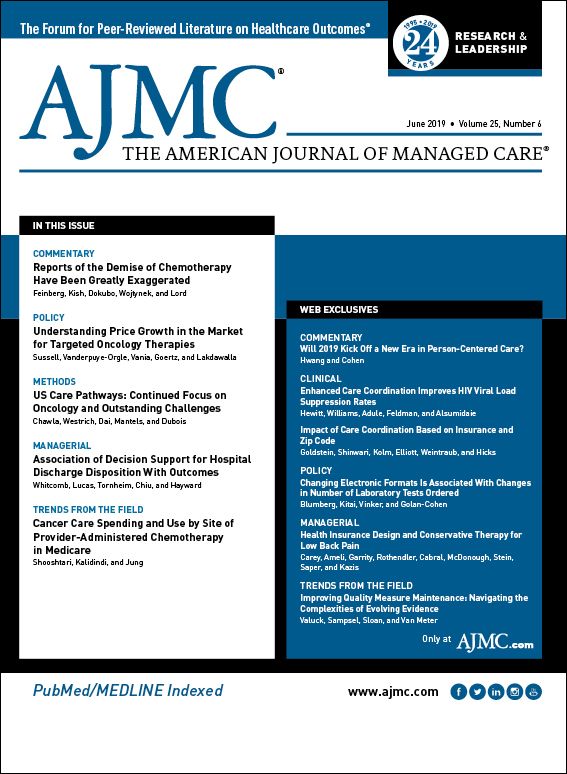- Center on Health Equity & Access
- Clinical
- Health Care Cost
- Health Care Delivery
- Insurance
- Policy
- Technology
- Value-Based Care
From the Editorial Board: Patrick H. Conway, MD, MSc
Despite years of intense public policy battles, the American healthcare system remains as impenetrably complex and infuriatingly unaffordable for consumers as ever. Americans should expect more of the industry, and the industry should hold itself to a higher standard. Healthcare fundamentally exists as a service to people to improve their health and well-being, yet I am confident that too few consumers and patients feel the system is working in their best interests.
At Blue Cross Blue Shield of North Carolina (Blue Cross NC), our vision statement is to be the model for transforming our health system through unwavering commitment to quality, affordability, and exceptional experience. Each element of that vision is designed around the people we serve so that we can realize a future of world-class care that is both accessible and affordable to everyone.
Here I offer 3 key concepts that are part of driving this ambitious level of change.
1. Accountability
Healthcare is astounding in its complexity and in the technological advances it inspires. Unfortunately, fee-for-service payments pit profits against patients in a way that deteriorates trust. We should all be able to have confidence that the decisions made about our health are not tinged with misaligned incentives.
The most powerful tool through which we indicate responsibility is payment. In North Carolina, we have launched a series of initiatives targeting healthcare transformation in which all new contracts include a path to significant shared risk based on cost and quality outcomes. Blue Cross NC already has almost 90% of its payments in value-based arrangements, but we are measuring advanced alternative payment models (APMs) where both the provider and the insurer are at significant risk for cost and quality. Our goal is to have more than 50% of payments in these arrangements by January 1, 2020. Then, as we incorporate new methods of paying for behavioral health, oncology, and other specialties, payment incentives will align across providers in a way that reflects the collaborative, high-quality care we know is possible. Our goal is to have as close to 100% of payments as possible in APMs with joint accountability by 2023.
2. Relentless Pursuit
Successfully transforming healthcare delivery will not occur overnight or without frustrations. Charting this course requires a cultural resilience to react and learn from setbacks so that the question becomes not whether but how we will achieve our goals. For employees, we talk about values such as Every Customer Matters and Show Grit and discuss how we need to display Fearless Leadership.
Multiparty dedication to this work is also essential. For instance, we are fortunate that NC DHHS Secretary Mandy Cohen has a similar philosophy to ours and is using the state’s transition to Medicaid managed care—in which we will participate as a health plan—to ingrain the program with value-based care and novel interventions that address drivers of health.
3. Evolving Roles
The health plan of the future will move beyond traditional health plan functions and will help individuals and families navigate the complex healthcare environment and improve their health and well-being. In North Carolina, we are doing this by building close partnerships with providers, community organizations, and technology innovators. Under models of shared accountability, we can find efficient solutions to person-centered goals instead of spending resources on oppositional activities or duplicative functions. The sharing of data and information needs to be frictionless and built for delivery of insights to consumers and providers when and where they need them to make informed decisions.
Americans quite literally cannot afford for us to fail. We will need health plans, providers, employers, policy makers, consumers, and others to work together to drive this change. We must move faster. At Blue Cross NC, we are striving to be a model of health system transformation for the nation. 
This letter was coauthored by JP Sharp, JD, MPH, of Blue Cross NC.

Blister Packs May Help Solve Medication Adherence Challenges and Lower Health Care Costs
June 10th 2025Julia Lucaci, PharmD, MS, of Becton, Dickinson and Company, discusses the benefits of blister packaging for chronic medications, advocating for payer incentives to boost medication adherence and improve health outcomes.
Listen
Specialty and Operator Status Influence Electronic Health Record Use Variation
January 22nd 2026Operators demonstrated specialty-specific differences in electronic health record efficiency, timeliness, and after-hours use, highlighting how workflow and training shape documentation behaviors across medical disciplines.
Read More

